Anytime I discuss mushrooms regarding neuropathy or inflammation, I typically receive the scrunch-ew-no-thank-you face.
I get it.
Some mushrooms have an earthy taste that doesn't appeal to the masses. Or it's the fact that they are fungi, and that alone can turn people off.
I've enjoyed mushrooms since I was little; my dad introduced them to me. However, the button mushrooms were deep-fried, but we have to start somewhere.
Two months after my Small Fiber Neuropathy diagnosis last year, my acupuncturist recommended I look into Lion's Mane; studies show their nerve regeneration powers are legit. At this point, I wanted off Lyrica. Pregabalin is an analgesic, anticonvulsant, anxiolytic, and sleep-modulating activity and is meant for treating epilepsy and neuropathic pain. In short, it tells the brain to cut off transmission to the neuropathic pain.
I was at my maximum dosage; however, my specialists wanted me to add more medications to control the pain. Here's the thing: we knew what I had, but what was the root cause? Could I locate the why to decrease the pain? Neuropathy is a progressive chronic disease. I'm not ignorant that I will always have pain or numbness, but can I slow the process? Could regeneration occur in some areas? What part of the pain was genuine, or had the Lyrica rewired my brain and wanted more medication?
It was time to find out.
Lion's Mane gets its name from how it looks. The shaggy spines or icicles give it an amusing appearance that mimics a lion's mane.
As of February of 2023, a study published in The Journal of Neurochemistry, scientists from The University of Queensland reported that the active compound from Lion's Mane, Hericium erinaceus, can enhance nerve growth and boost memory.
Research indicates that Lion's Mane may help alleviate neuropathy symptoms, a condition characterized by nerve damage and dysfunction, by promoting nerve growth factor (NGF) production and reducing inflammation.
Neuropathy symptoms can range from mild cognitive impairment to severe pain and loss of limb function. Studies have shown that Lion's Mane may promote myelin sheath production and support repairing damaged nerve cells in the brain and peripheral nervous system.
Where I lived then, I couldn't access fresh Lion's Mane. Foraging wasn't an option for me physically. Therefore, I started with an extract, which I added to my coffee. I'd never heard of this mushroom, and my research began.
With any chronic pain or disease, we want relief immediately. It doesn't work that way. Sometimes, it does with medications, but our bodies adapt and want more. Before we know it, we are on 8 different addictive pain medications that aren't helping any longer, and we are desperate for relief.
There has to be another way.
I did not believe Lion's Mane would magically heal me; I'm optimistic but also a realist. Also, trying alternative paths is going to be a good thing.
I'm a why not kind of girl.
People ask, "You're an herbalist. You should know what will work."
Yes and No.
Mushrooms are a whole different game.
When we moved back to Sioux Falls, I was surprised to find fresh Lion's Mane at the Co-op and Pomegranate Market.
How is this possible?
It's winter.
In South Dakota.
A local business, Dakota Mushrooms & Microgreens, grows Lion's Mane and sells grow kits.
Sign me up!
Recently, I harvested my very own Lion's Mane. My zen den (office) closet is now where I grow mushrooms, dry flowers, and herbs.
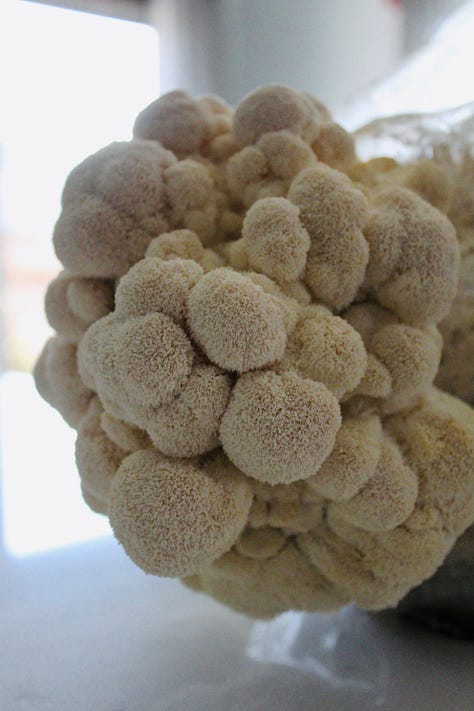
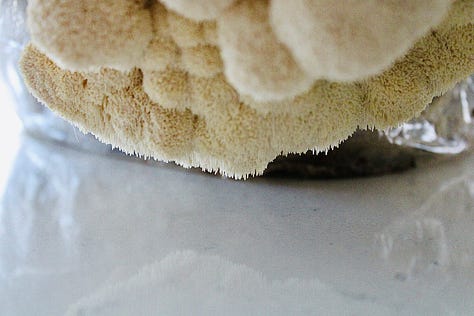
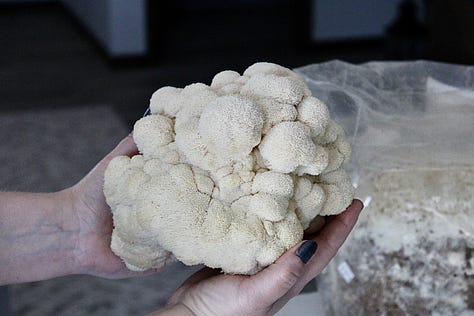
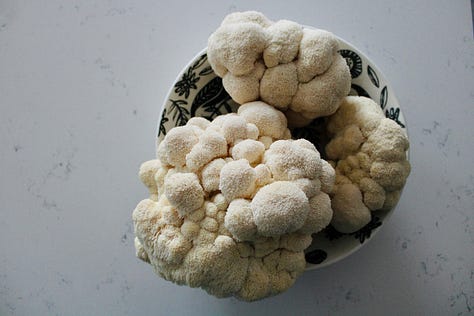
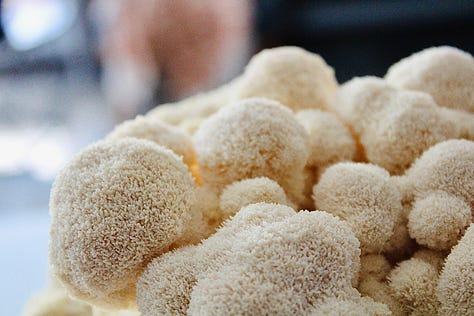
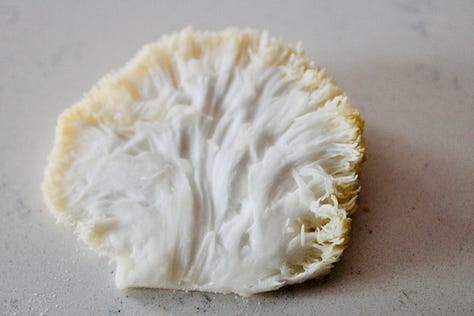
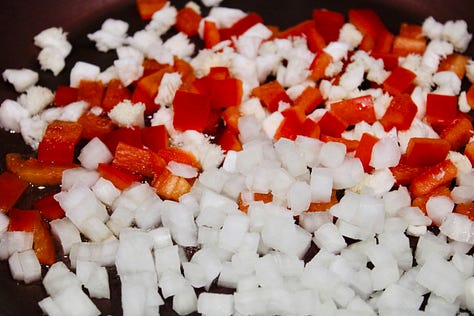
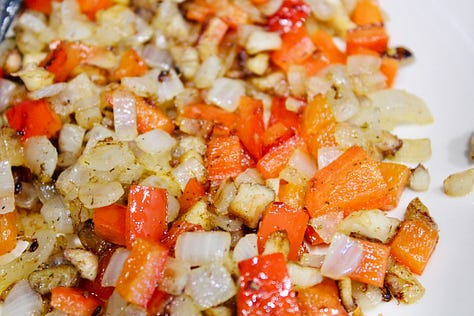
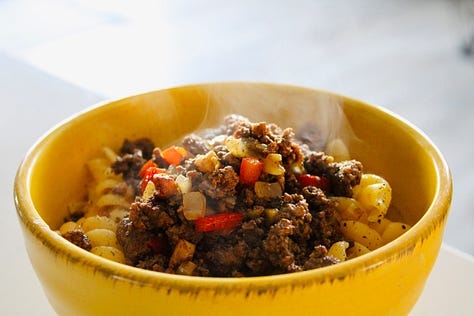
Personally, I love cooking with mushrooms. Lion's Mane takes on the dish's flavor, which works well for those who don't enjoy the earthiness of mushrooms. I've sauteed mushrooms, onions, and peppers and added them to homemade bread. My mom, who doesn't like mushrooms, loved the bread and couldn't tell the Lion's Mane was present.
They also have Lion's Name extract for people who don't want anything to do with eating mushrooms. Powered extract is different than powdered mushrooms. Many holistic powder drinks claim to contain mushrooms; make sure to read the label. Their extract does not have mycelium on grain. The mushrooms are cooked "low and slow" at 190F for 6 hours. They are freeze-dried with all the juices to create a lovely, ultra-fine powder you can add to food or drink. The extraction process allows your body to absorb all the available nutrients easily. Mushroom cell walls are composed mainly of an amino-polysaccharide polymer called chitin. Our digestive systems are not well equipped to break this down. This is where heat comes into play and is one of the main reasons cooking mushrooms is recommended.
After my first successful harvest of Lion's Mane, I'm venturing out to other mushrooms. It's one of the many reasons I love herbalism.
Studying and experimenting.
Some work out, and some don't. And that's okay.
Regarding my health, I will do whatever I can to remain mobile.
Neuropathy is unforgiving. It's unpredictable.
There is so much we don't know. Treatments are limited, and a small percentage bring relief. There needs to be more.
More education.
More compassion.
More understanding.
Less judgment.
Some treatments I've tried received raised brows and eye-rolls, primarily from medical professionals. But when I am only given the medication option and nothing further, I will seek other options. I'm not anti-medication; hell, it kept my dad alive longer than expected, but what if there is something beyond medication?
I get closer to the root of my neuropathy and won't give up.
I don't want you to either.
Remember, I'm in the trenches with you.
On my Last Nerve, I will discuss all things the nervous system and my experiences. There is much to discuss, but I wanted to start with Lion's Mane since it's my most recent endeavor. This is a little snippet of what's to come.
Has Lion's Mane decreased my neuropathic pain?
I believe it has, not as the main lead, but definitely a supporting role. Another nerve study and biopsy would be needed.
I'm always here if you have questions about Lion's Mane or neuropathy. Or questions about anything.




